NCLEX Tips for Passing From Practicing Nurses
To help you get ready for the NCLEX, we asked nurses for their best advice for passing. Many of these tips overlapped between those who we asked, so you won’t be alone in trying these.

It’s no secret that nursing is a difficult profession. They have a lot on their plate with long shifts, emergencies, losing patients, and communicating with families.
But the stress surrounding nursing isn’t new. Preparing to become a nurse can be just as stressful. After all, professors want to make sure their students are ready to handle difficult situations once they’re in the field.
One of the biggest anxieties for nursing students is taking and passing the licensing exam. The National Council Licensure Examination (NCLEX) determines if someone is ready to be an entry-level nurse.
Of all candidates who already took the NCLEX in 2020, there is almost a 75% pass rate. And of first-time US-educated students, the pass rate is nearly 88%. Even though there is a high pass rate, it’s still stressful. This is due to the structure of the test.
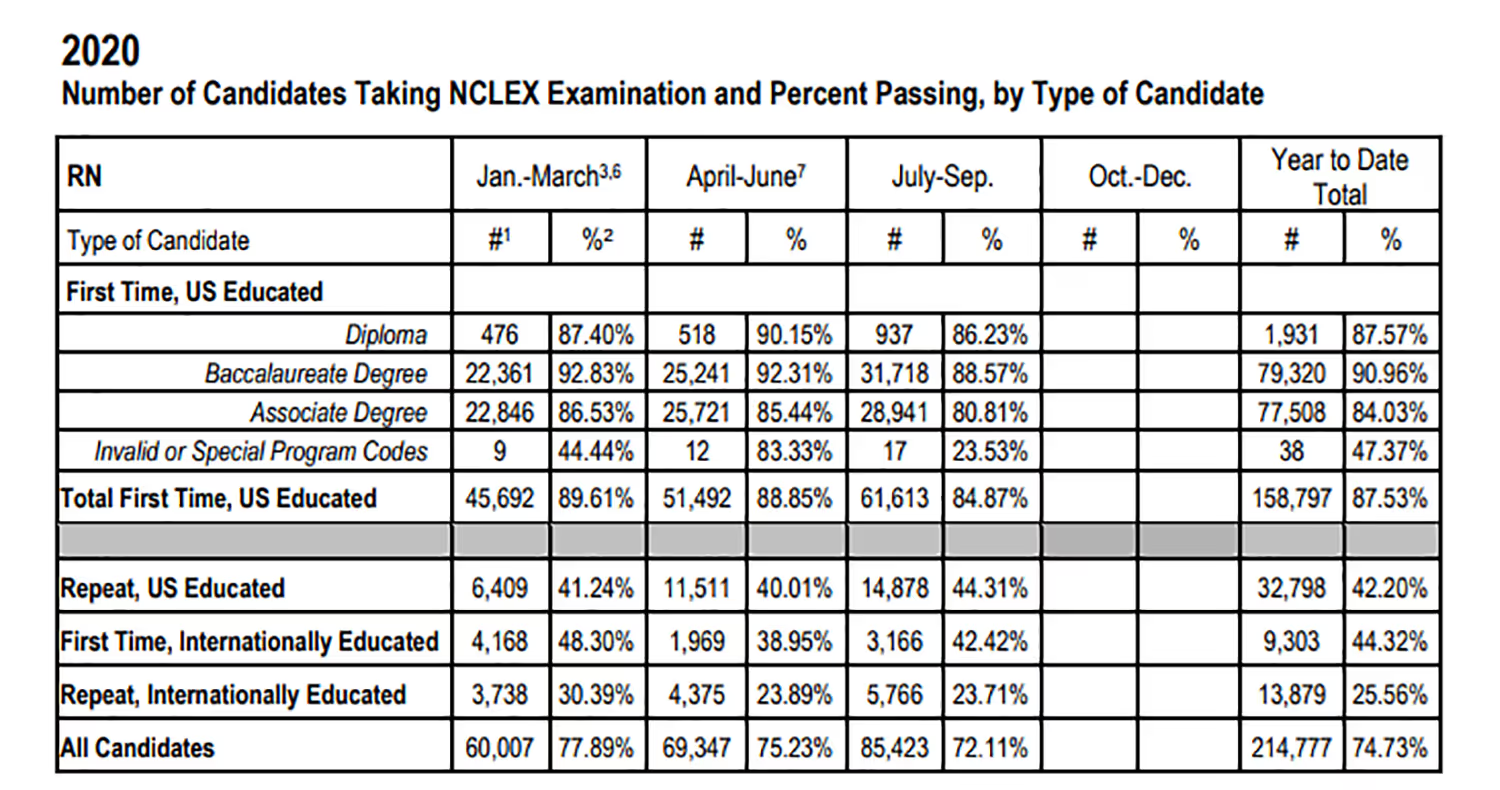
Kaplan Nursing, an NCLEX preparation site, says that this exam is different from any nursing school test since it isn’t knowledge-based. Instead, it tests application and analysis using the knowledge that students learn in school. It tests critical thinking skills for making judgments to ensure that a person can safely practice as a nurse.
This makes studying difficult since it isn’t about memorizing the correct answers. It’s more about understanding concepts to rationalize which choice is best. But stressing over it makes it difficult to prepare and get through the exam.
To help you get ready for the NCLEX, we asked nurses for their best advice for passing. Many of these tips overlapped between those who we asked, so you won’t be alone in trying these.
Take it Early
“Try to take it as soon as possible after graduating from nursing school. Continue studying up until the test week after graduation.” - Nicholas Marino, RN, BSN, Summa Health
You must pass the NCLEX within three years of graduation. Of course, the majority of nursing school graduates won’t want to wait that long, especially if they want to start working as a nurse right away. But some decide to take their time, which is OK.
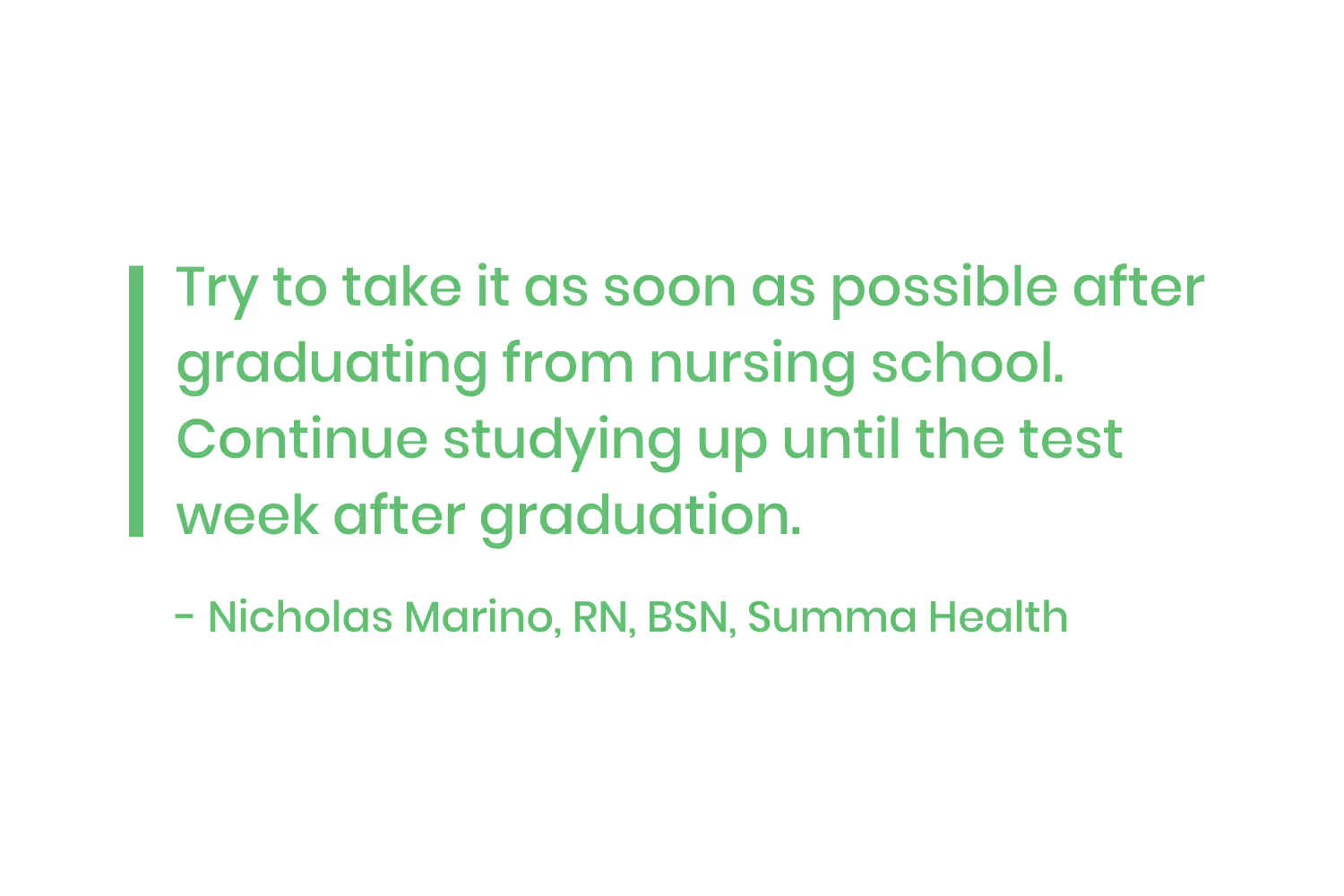
It might sound nice to have more time to study, but the longer you wait, the more information you’ll forget from schooling. This concept goes back to “The Curve of Forgetting”.
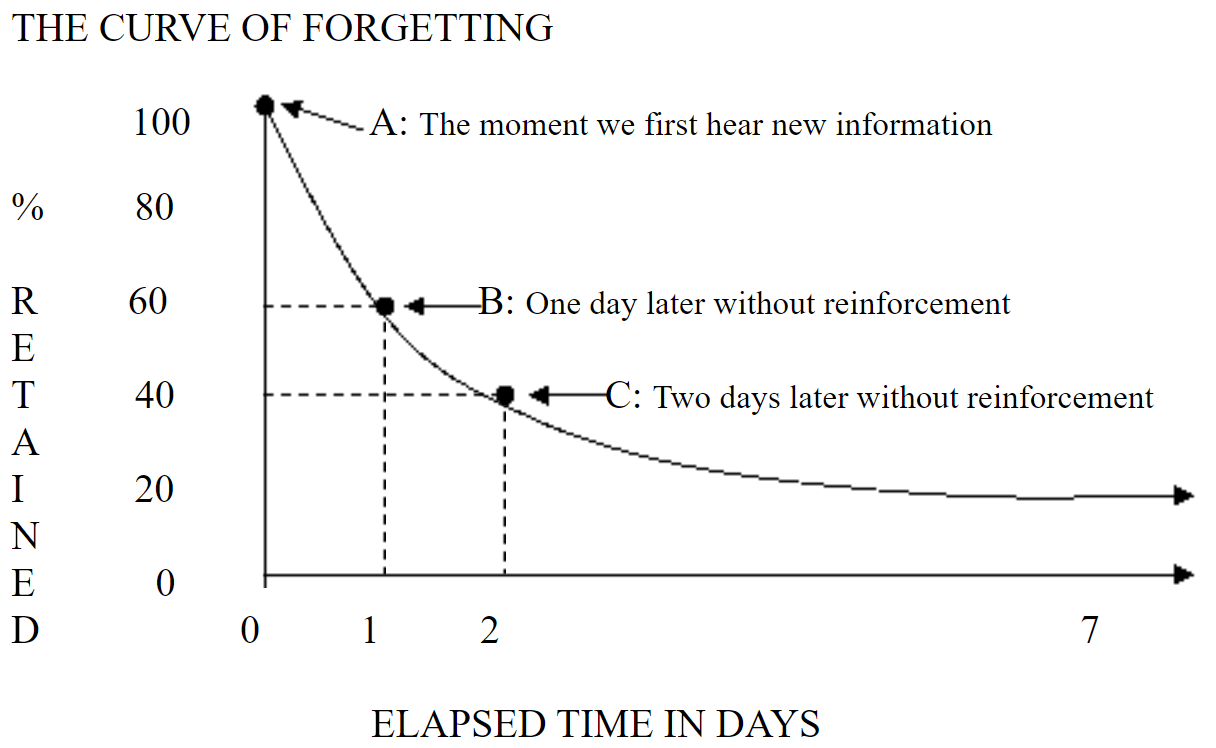
You won’t feel as motivated once you’re out of a classroom and test-taking environment if you’ve waited, either. Waiting also means more time out of clinical settings, which are a key component to learning nursing concepts.
Find a Good Study Spot
“My first tip would be to find a good study spot. This helps you stay focused.” - Lillian DeGarmo, RN, BSN, Nationwide Children’s Hospital
Everyone studies differently, so finding a spot that best fits your style is key. Some people can’t focus when there’s background noise. But others find silence distracting since it’s more obvious when we don’t hear any noise.
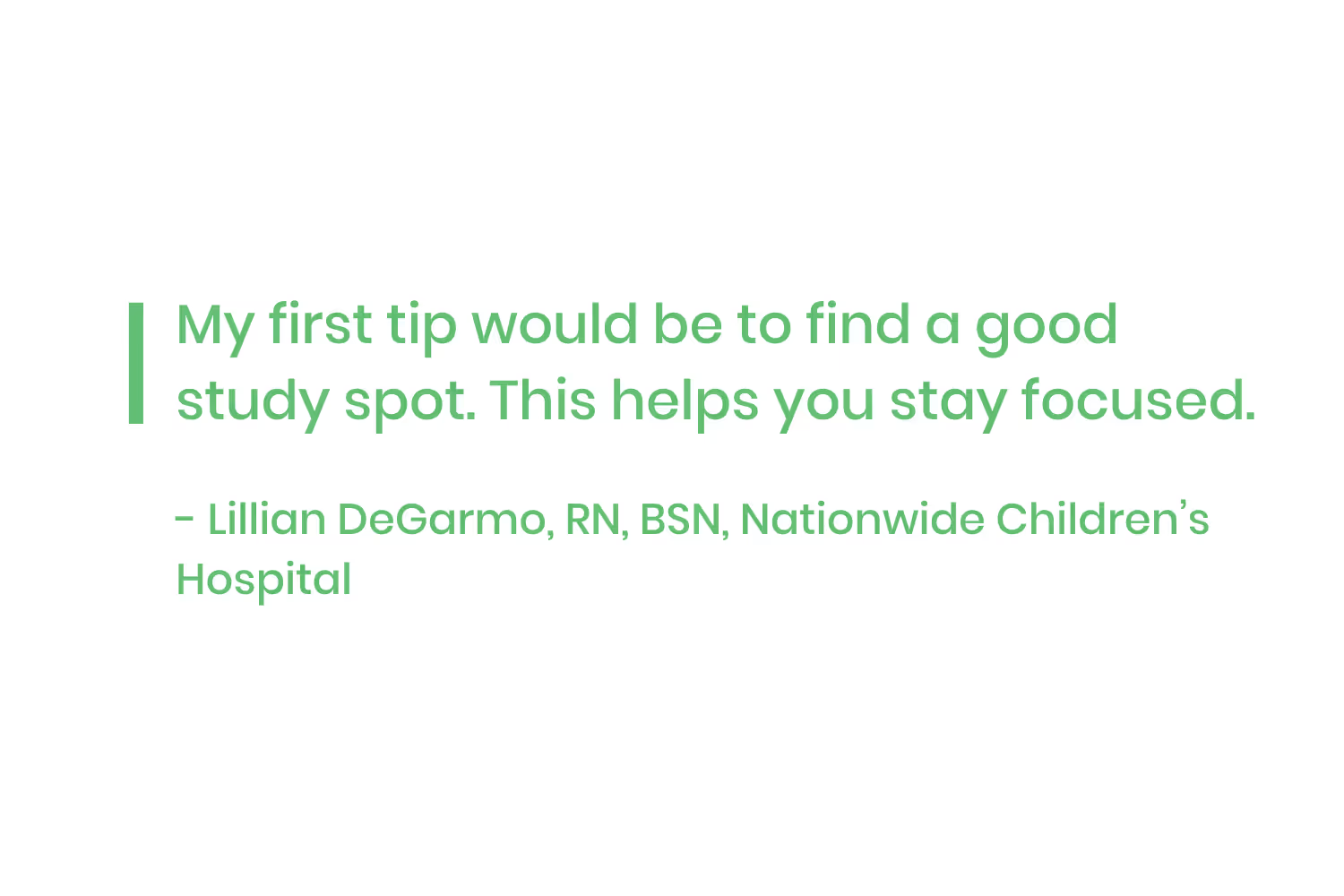
David Smith, professor of Psychology at Cornell, mentioned the importance of where you study, “The things that you learn get linked to the place where you learned them. The environment becomes a cue to retrieve the information that you learned in that context.”
Don’t try studying in an environment where you’ll have a lot of distractions and interruptions. The more difficult it is to concentrate, the harder it will be to learn concepts.
Get a Review Question App
“There are some pretty affordable apps that are just question banks divided by category that can help a lot! I used NCLEX RN Mastery.” - Bethany Clark, RN, BSN, Summa Health
Textbook studying isn’t enough for taking the NCLEX. There’s so much material that you would never know where to start.
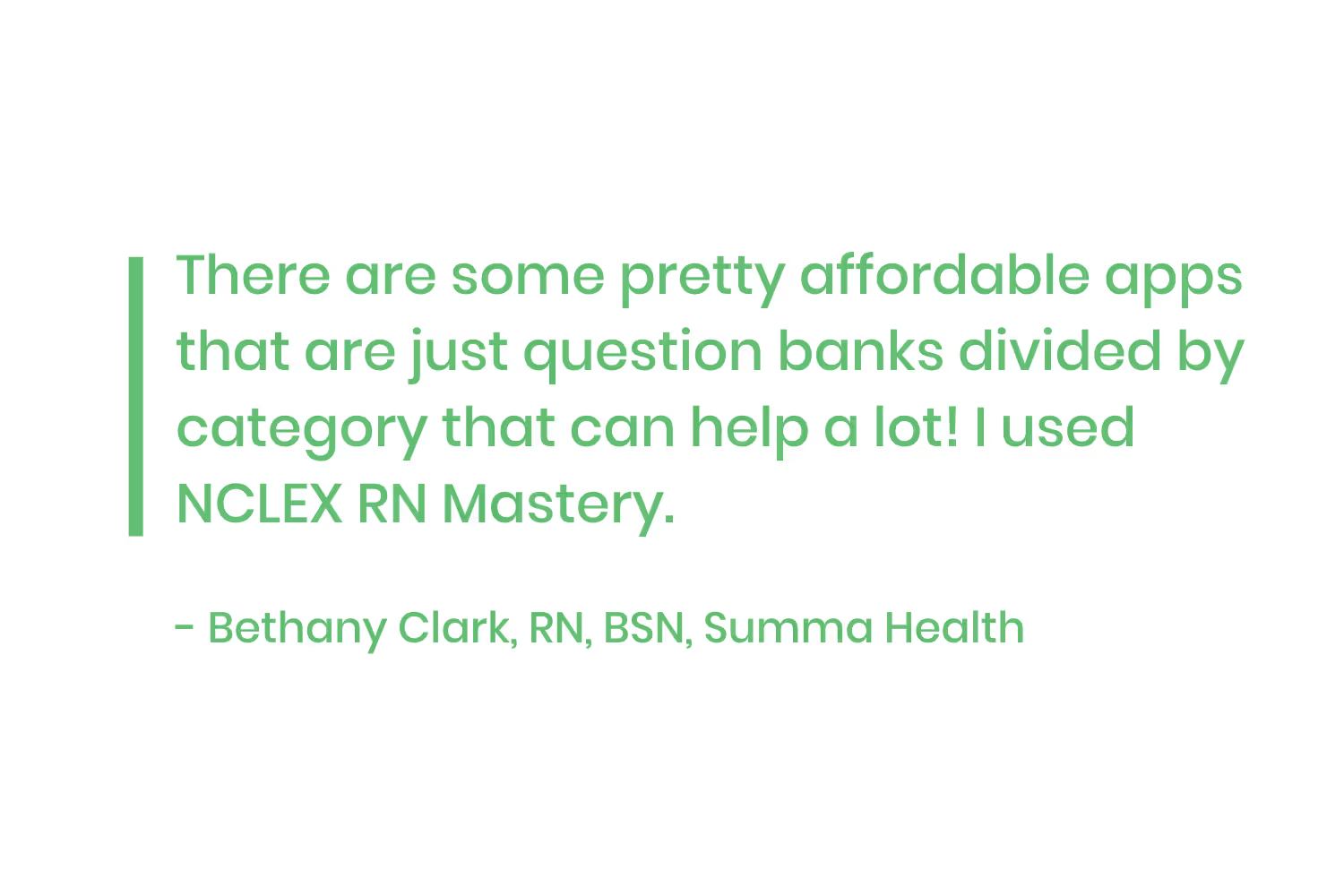
There are plenty of study programs and apps full of questions similar to the test.
Evaluate and research all of them, everyone who takes the test studies differently. Determine which one you like the most and get started.
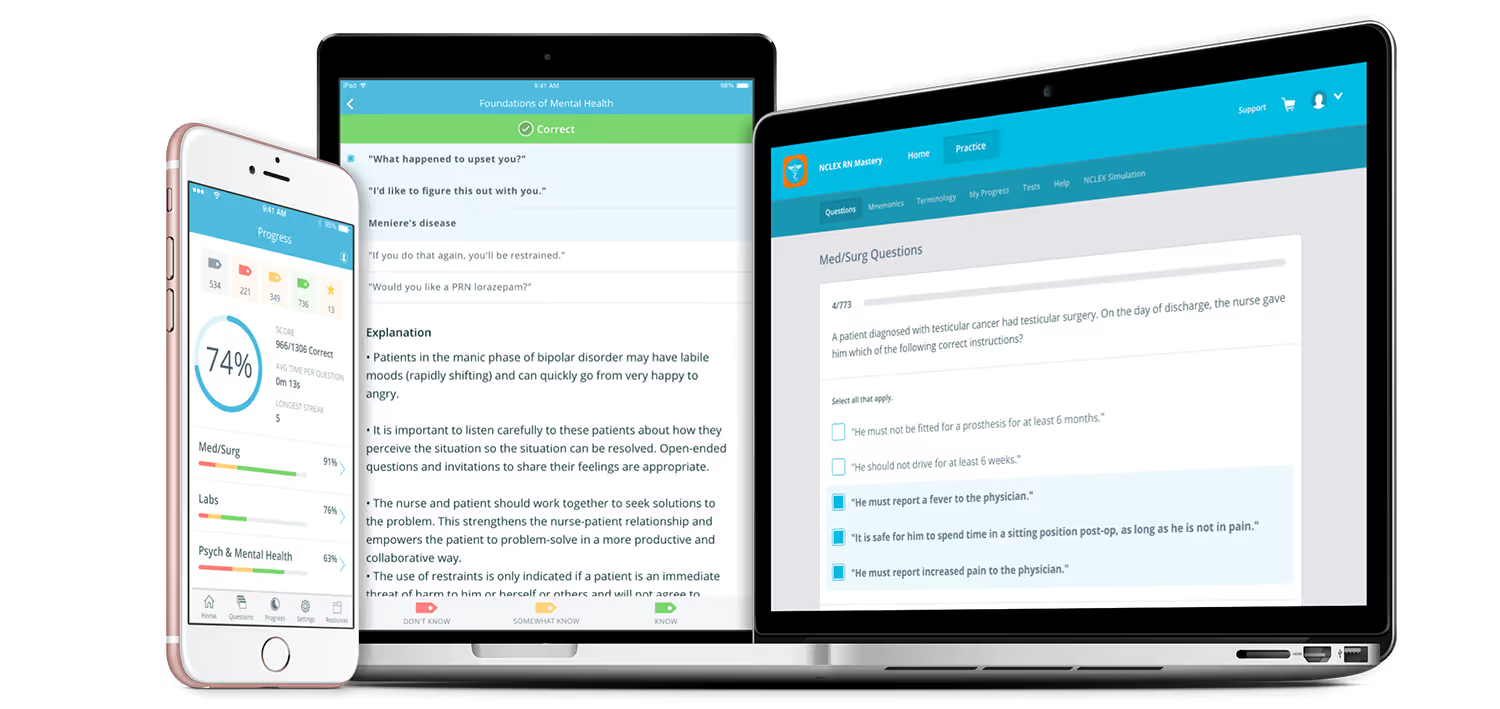
Come up with a Study Plan
“I got the ticket to my test on June 1 and took the NCLEX on July 1, so I came up with a month-long study plan. Stick to your plan. My tips would be to make your own individualized plan because you know your strengths and weaknesses. Include mental health days in your schedule, too!” - Sherri King, RN, BSN, Cleveland Clinic
While it’s good that there are so many preparation courses, it can still be overwhelming deciding which ones to use.

Everyone has a different technique, create a plan around your style to help you tackle the daunting task that lies ahead.
Make a schedule for which concepts to review, which courses to use, and when you’ll take breaks. You can even log how you do in each area. This keeps you accountable for how much you study, and you’ll keep track of which sections to focus on more.
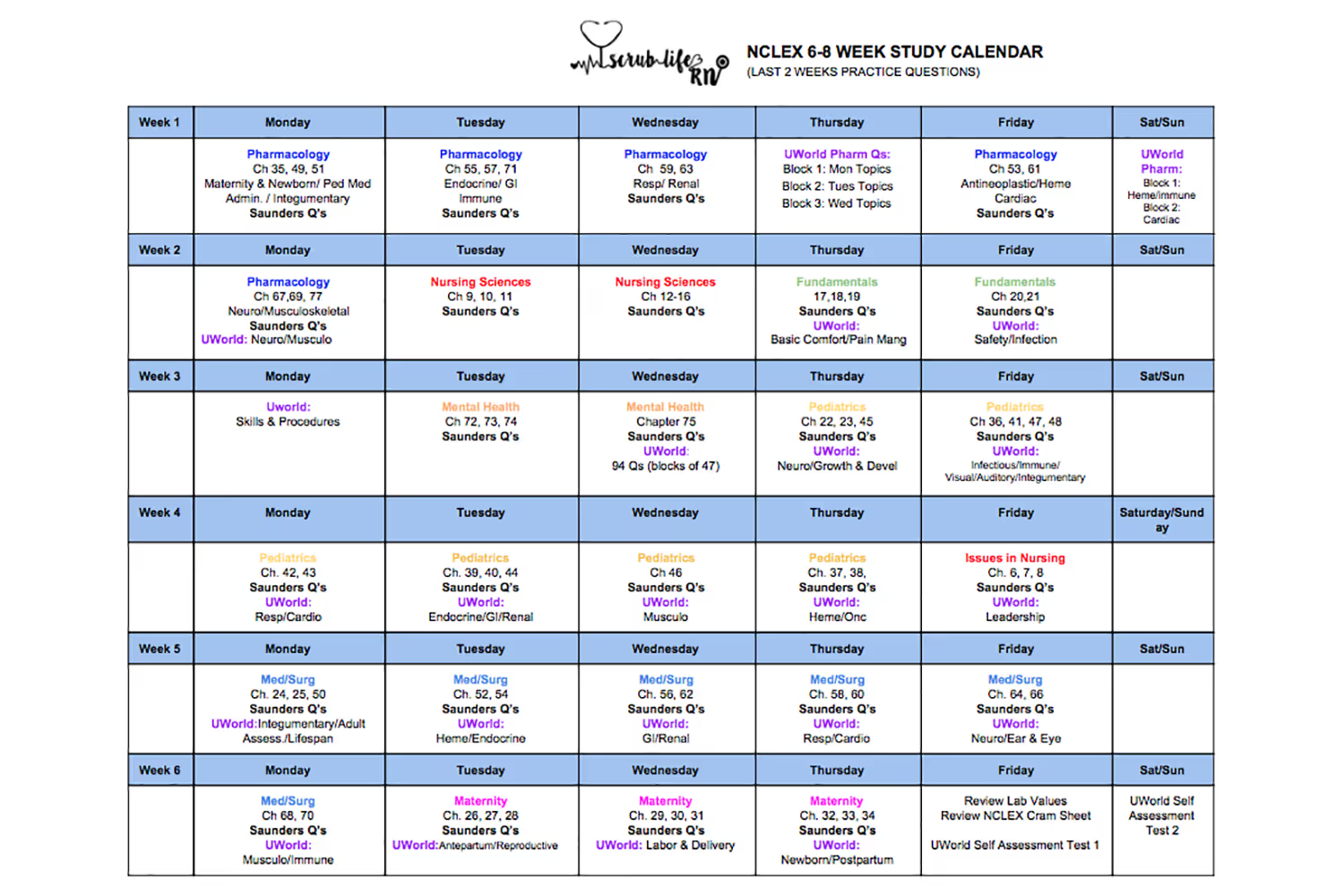
Take Advantage of Your Free Time
“Get a mobile app that you can do questions from wherever, even if you just have time for a few while waiting in line somewhere.” - Francesca Congeni, RN, BSN, University Hospitals Rainbow Babies and Children
It can feel burdensome to always designate time to study. If you have a few minutes free, use one of the mobile apps to answer questions.
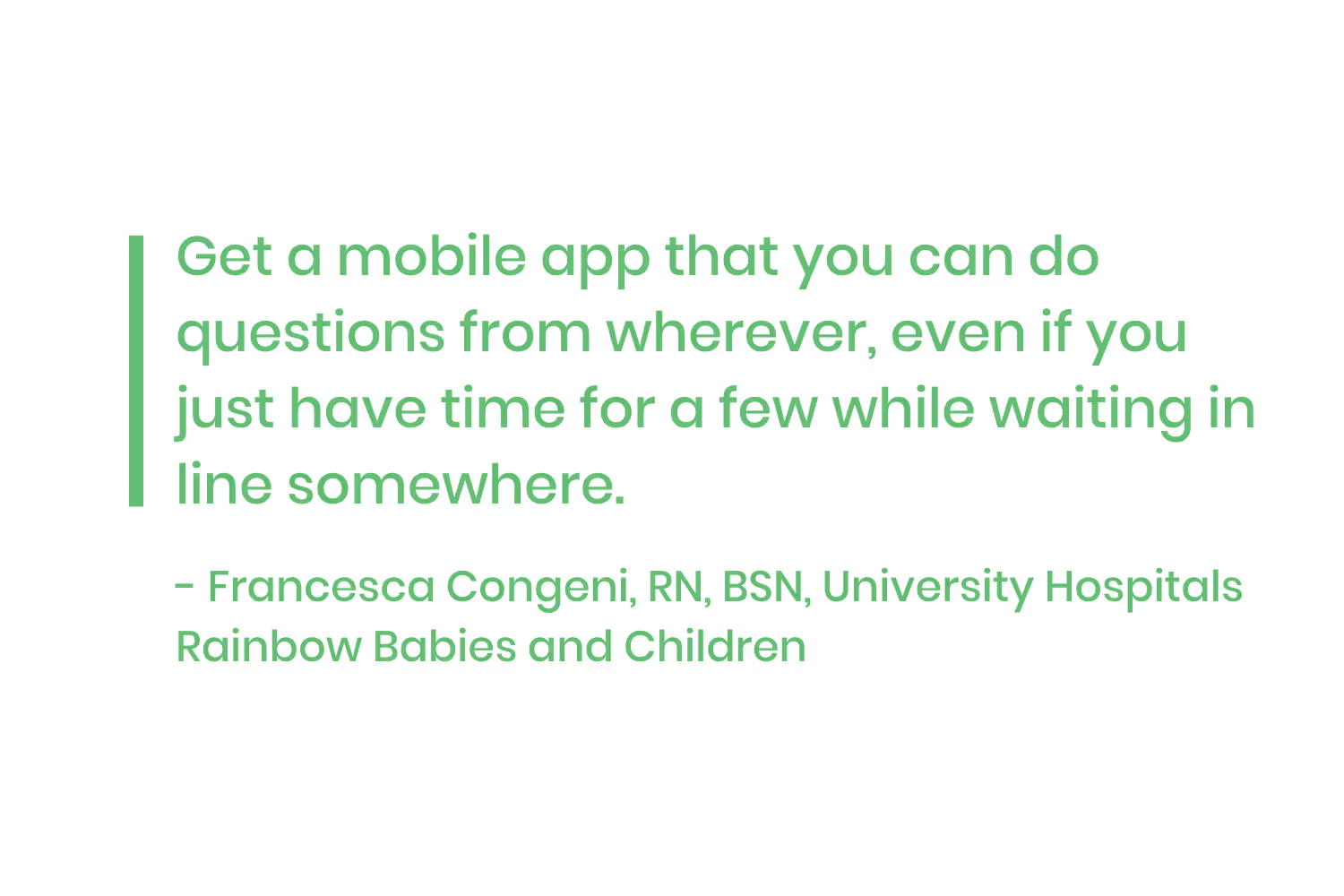
You won’t be in study mode so you won’t feel as stressed when answering them. It’s an easy way to review questions without feeling like you’re spending so much on it.
A little bit here and there can add up to a lot.
Review What You Missed
“I would recommend using the UWorld study program and do 75-100 questions per day. Also, write down the rationale questions you got wrong in a notebook and review those notes every day!” - Isaac VerDow, RN, BSN, Ohio Health
This might seem obvious, but the questions that you get wrong will show the areas you need to review more. Take note of the specific questions you miss and keep reviewing them. Writing these down can also help you find any patterns.
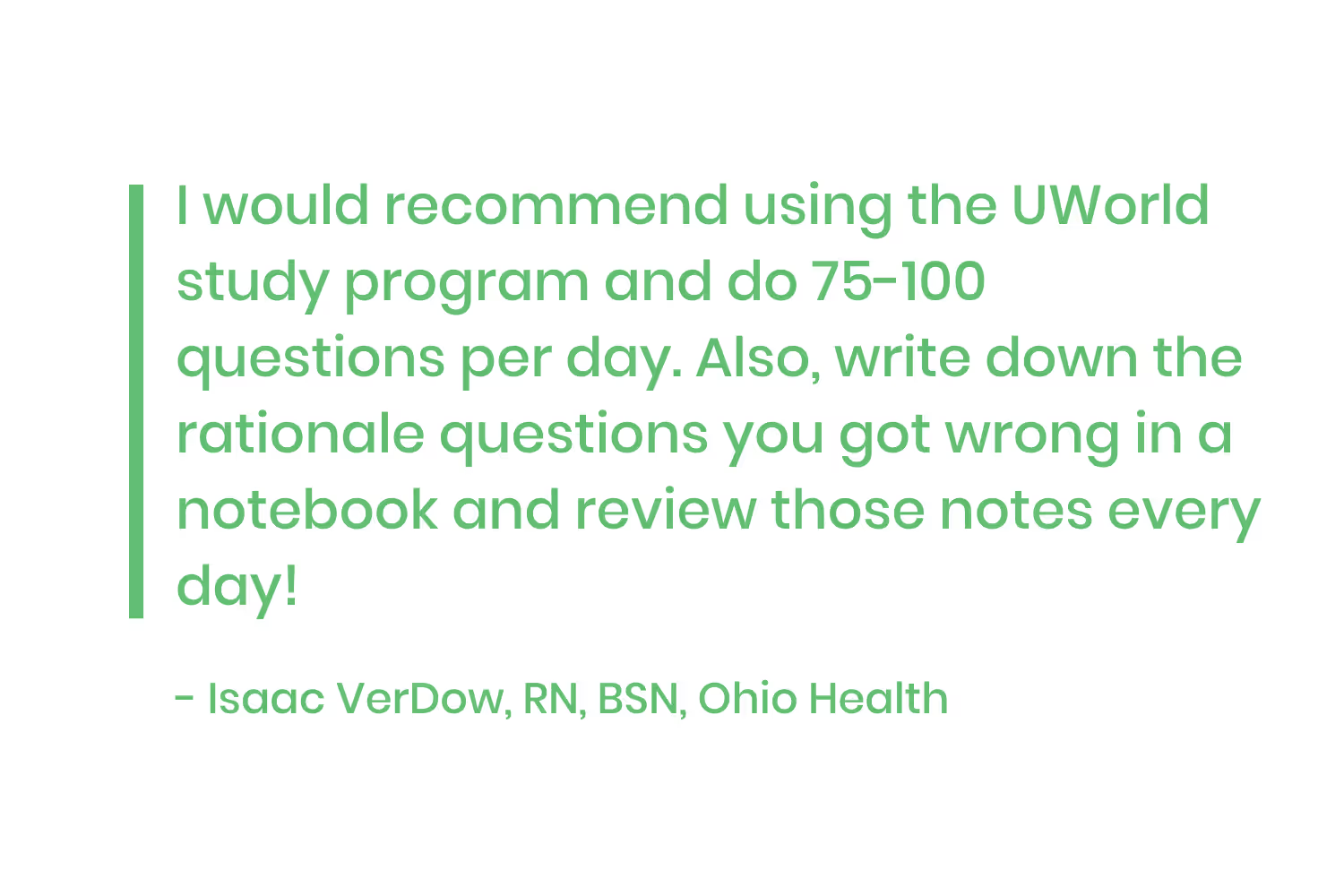
For example, you might be struggling with a specific question style, concept, or category.
Taking these notes is an active form of learning. This takes longer than passive learning, but it’s more effective. Active learning helps move information into your long term memory faster.
Gain Experience Where You Can
There are job opportunities such as nurse technician, nurse aide, or internships that you can get before taking the NCLEX.
Some hospitals may hire you between graduation and passing the test so you can get experience. Not only does this jumpstart your career, but having hands-on experiences helps with responding to test questions.
“I didn’t pass the first time I took the test. The second time I took it, I was working as a nurse technician. I think that helped because I could understand how to answer questions after having experience with specific situations.” - Charlene Marino, RN, BSN, Scioto Family Physicians
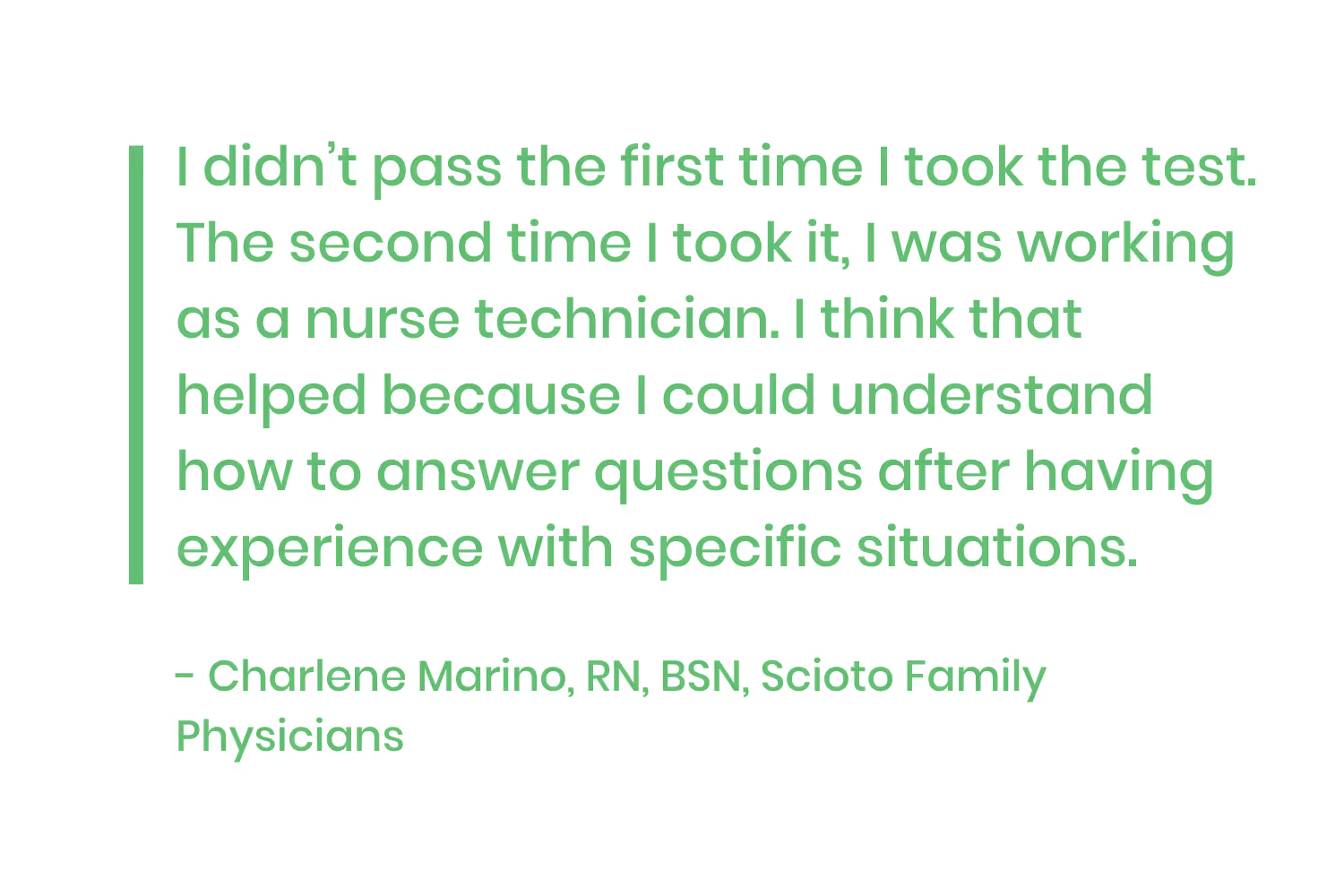
Find a Buddy
“Find a small group to video chat and go through questions with. This is motivational during times of burnout.” -Alyssa Kendrick, OMS1, BSN, RN, Heritage College of Osteopathic Medicine
It can be hard to stay motivated through the stress of studying. It’s easy to get distracted or start feeling like your studying methods aren’t good enough.
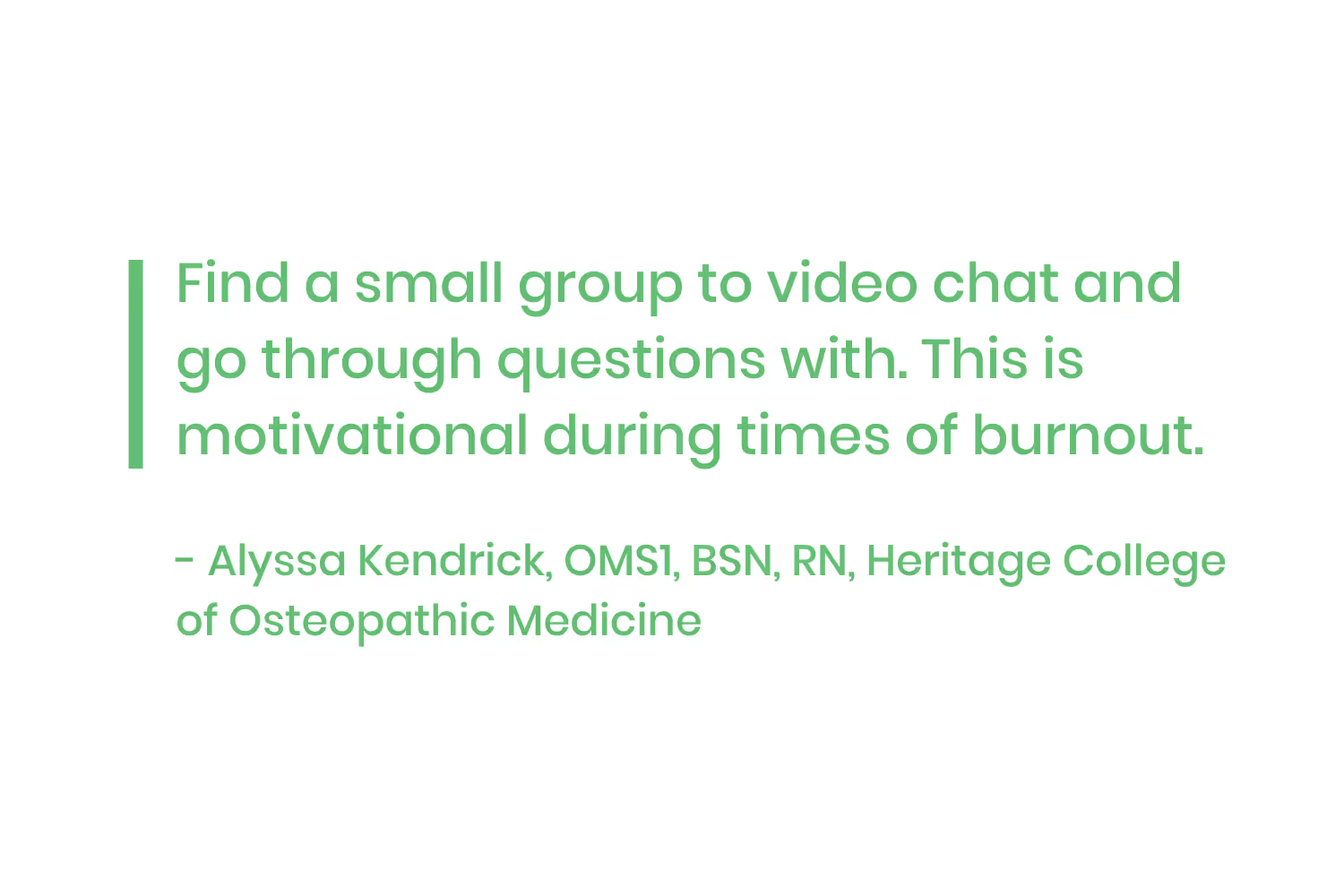
Finding someone else to study with can help you focus better. They can also help fill any gaps that you’re struggling with.
Simulate The Test
“Simulate the testing environment by setting aside distractions, finding a quiet place, and taking a practice test. Do over 100 practice questions in a row to train on focusing for the whole test.” - Erin Clark, RN, BSN, Mayo Clinic
This can help reduce any test anxiety you might have. It gives you a sense of what taking the test will feel like.
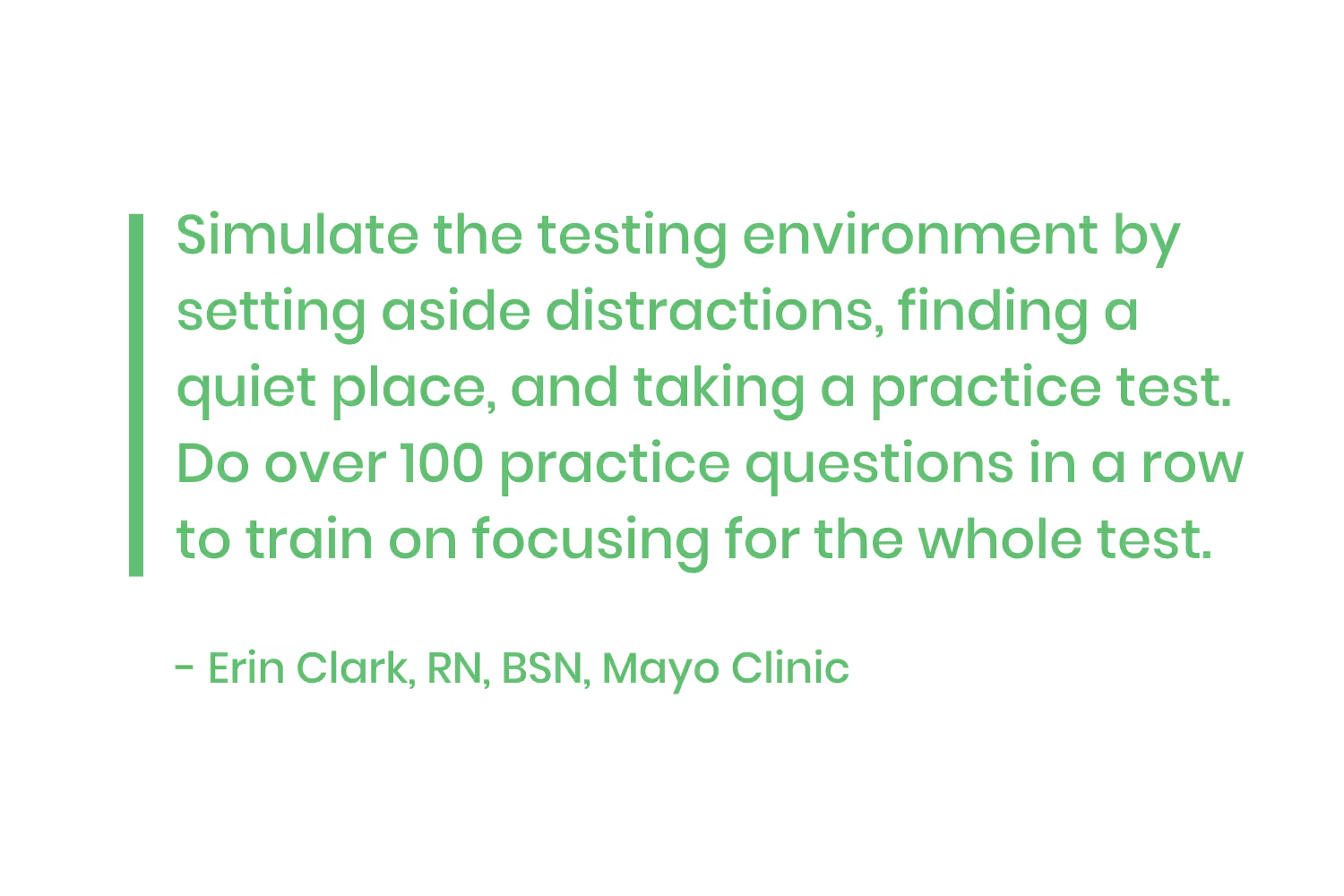
You can even simulate it down to what food you will eat before, what you’ll wear, and what time you’ll take the test. That way, you can prepare for how to feel the best and most comfortable taking the exam.

I know, getting that granular sounds crazy. However, it may help free yourself from any distractions when the day arrives.
Read Each Question Carefully
“They word the questions tricky, and it’s very easy to misinterpret what they’re asking. I would cover all the answers with my hand while I read the question or scenario. Then I would pick out keywords or phrases to help direct my answer. I then read every single answer, one at a time, even if I was 99% sure of my answer. Because sometimes they like to put more than one right answer since it’s about choosing the best one.” - Laura Vlacovsky, RN, BSN at Mercy Medical Center
The NCLEX isn’t about memorizing answers since it tests on critical thinking and analysis.
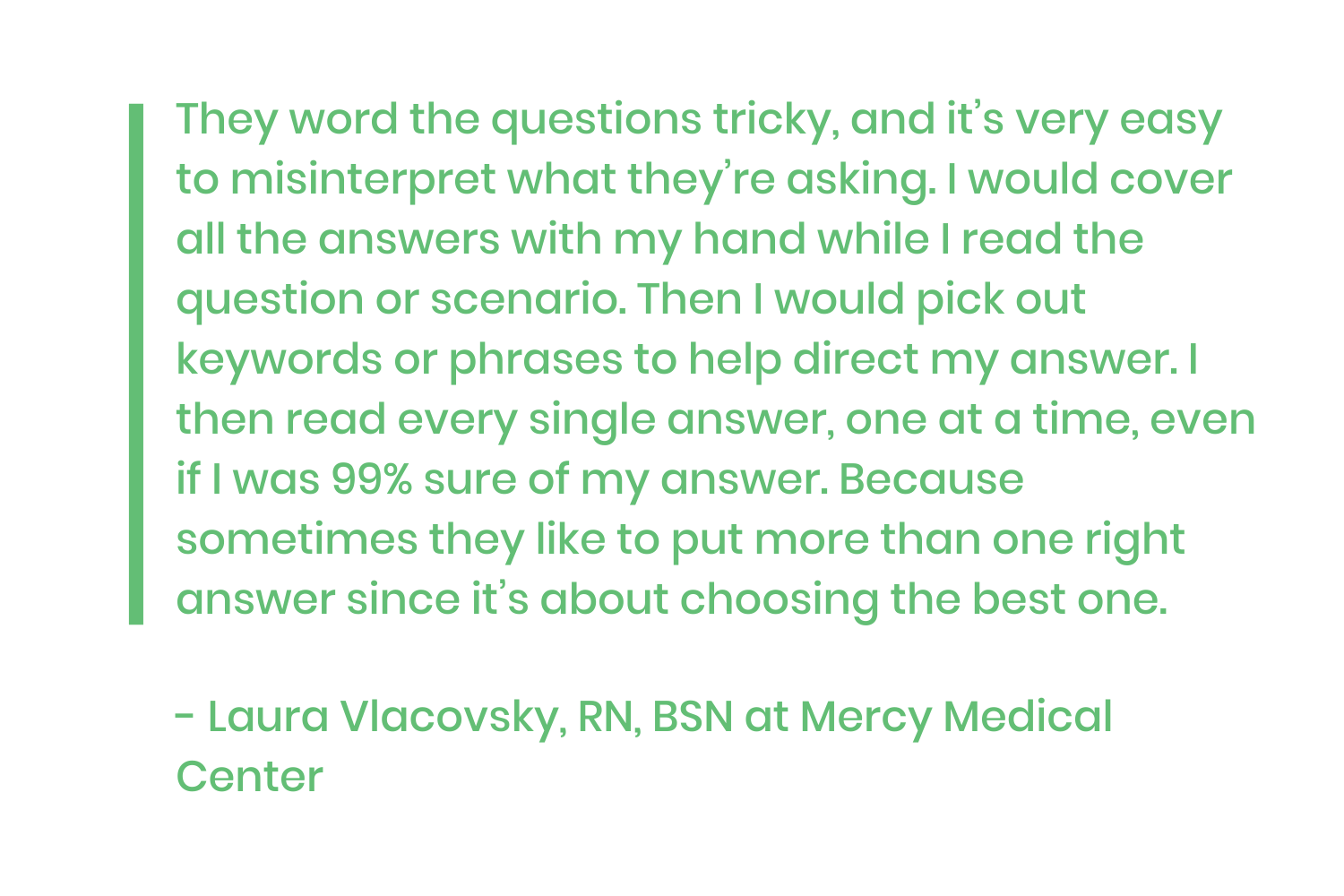
A lot of the questions ask for which option is the best option, not necessarily the only option.
Instead of trying to memorize the correct answer, try learning how to answer the questions as you take practice exams.
Don't Overthink It
“Once you pick the right answer, you need to move on. The longer you stare at a question and read into it, the more likely you are to overthink it and change your answer.” - Emma Rosenbaum RN, BSN, Vanderbilt University Medical Center
The questions will try to trick you.
The more time you spend on one, the more confused you may get. If you’ve studied how to answer the questions, then focus on doing this.
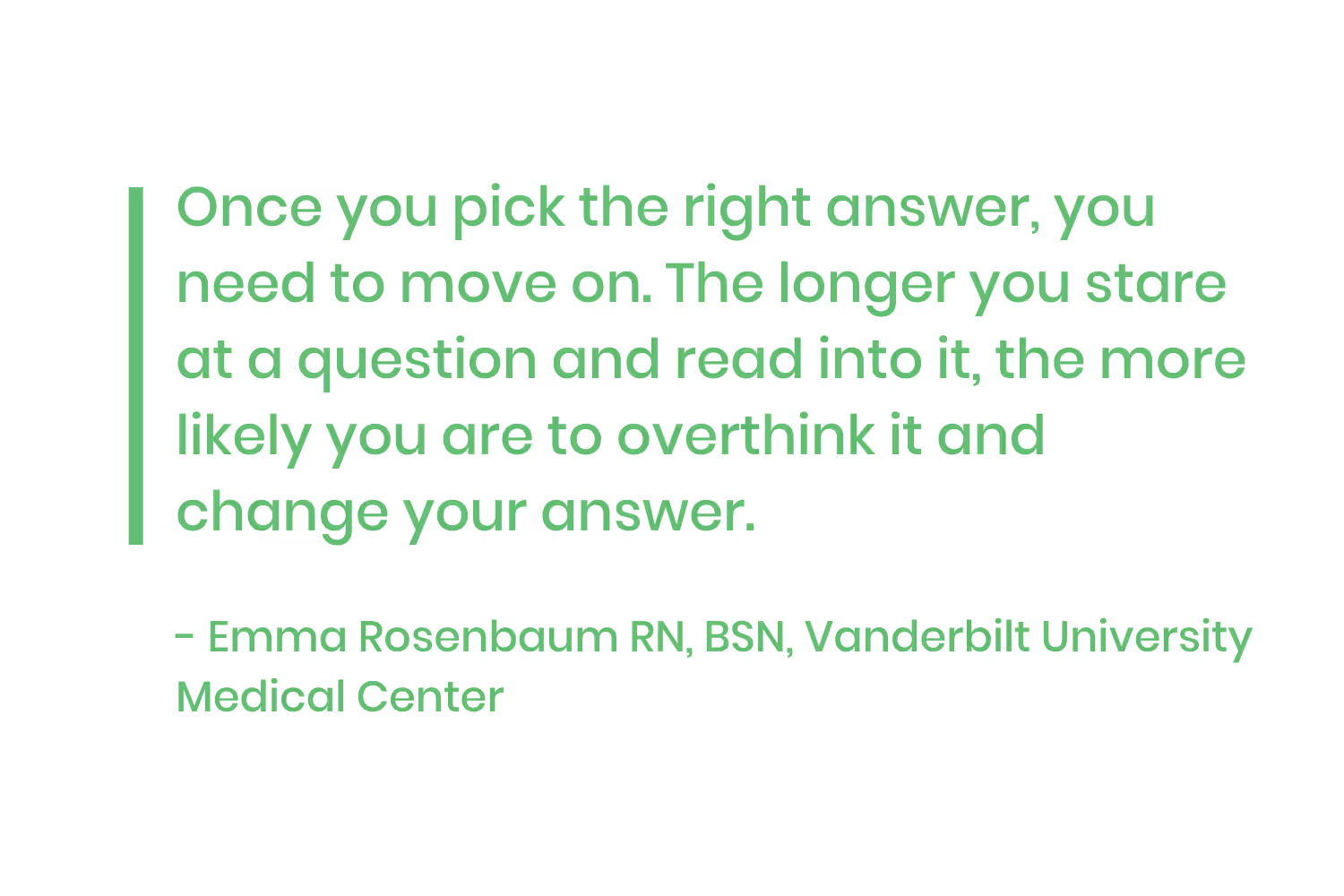
Once you pick out the most important details and which answer correlates to that best, then choose your answer and continue.
However, don’t fall for the “First Instinct Fallacy”. Just because you selected an answer the first time around, doesn’t mean that it’s correct. If you’re really not sure, answer the question, mark it and come back to it once you’ve completed the rest of the test.
Refocus During The Test
“When you’re taking the test, pause at question 74. There’s a minimum of 75 questions to pass, and I knew that if I didn’t end at 75, I would psych myself out. So take a break to relax and focus. Get some water and take deep breaths to prepare yourself in case you don’t pass after the minimum 75 questions.” - Marissa Foote, RN, BSN, Saint Luke’s Hospital
The test asks a minimum of 75 questions but it could go up to 265 depending on your performance.
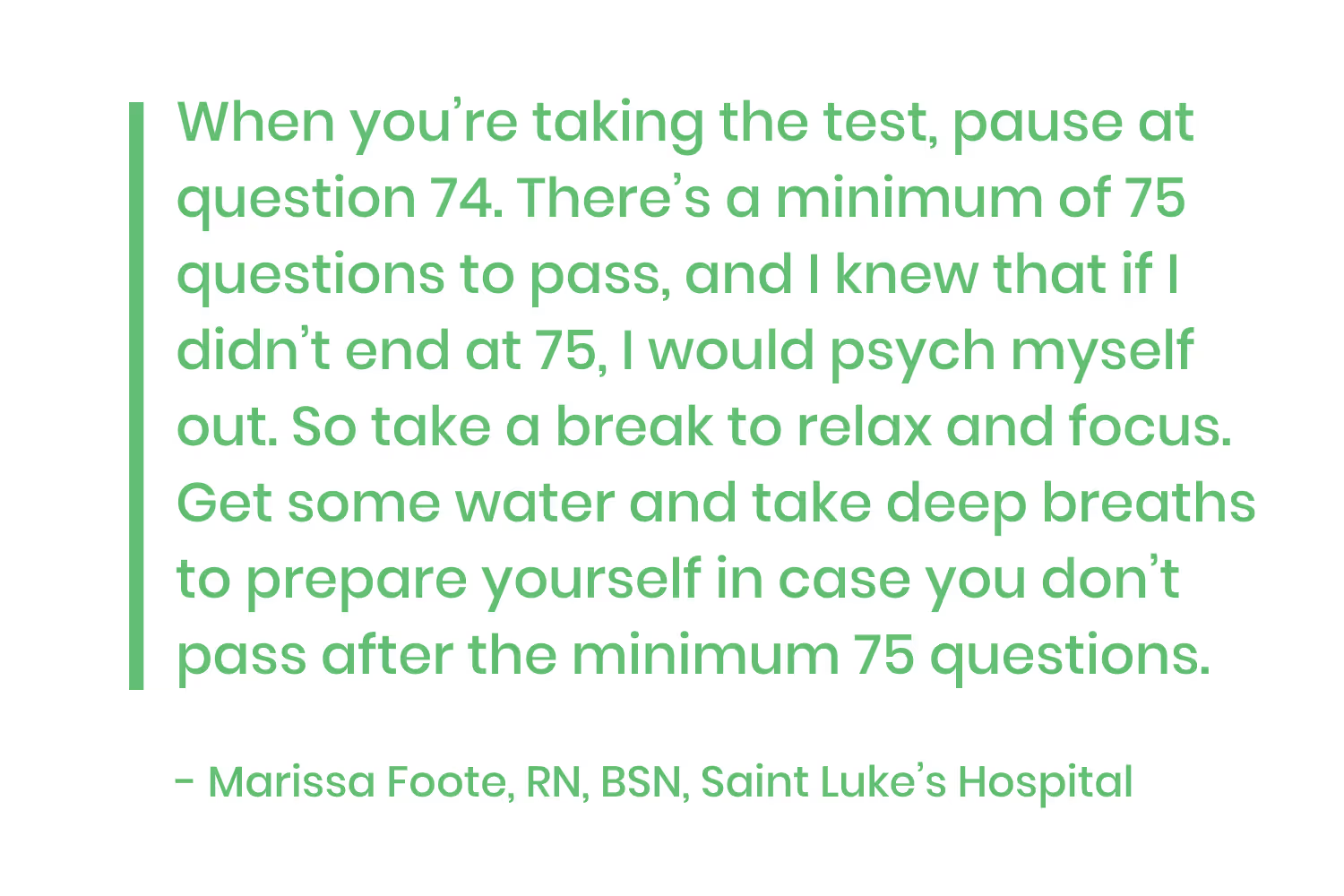
After 75, the test can shut off at any time. This depends on if you’ve displayed minimum competency or lack thereof. If you’re right at the threshold of passing or failing, then you keep getting questions until the test can score you above or below that threshold.
Take a break before you get to the minimum so that if the test doesn’t shut off after question 75, you feel focused to continue. Just because you aren’t already above the threshold for passing doesn’t mean you won’t pass. It could shut off at any time once you’ve reached the standard for passing.
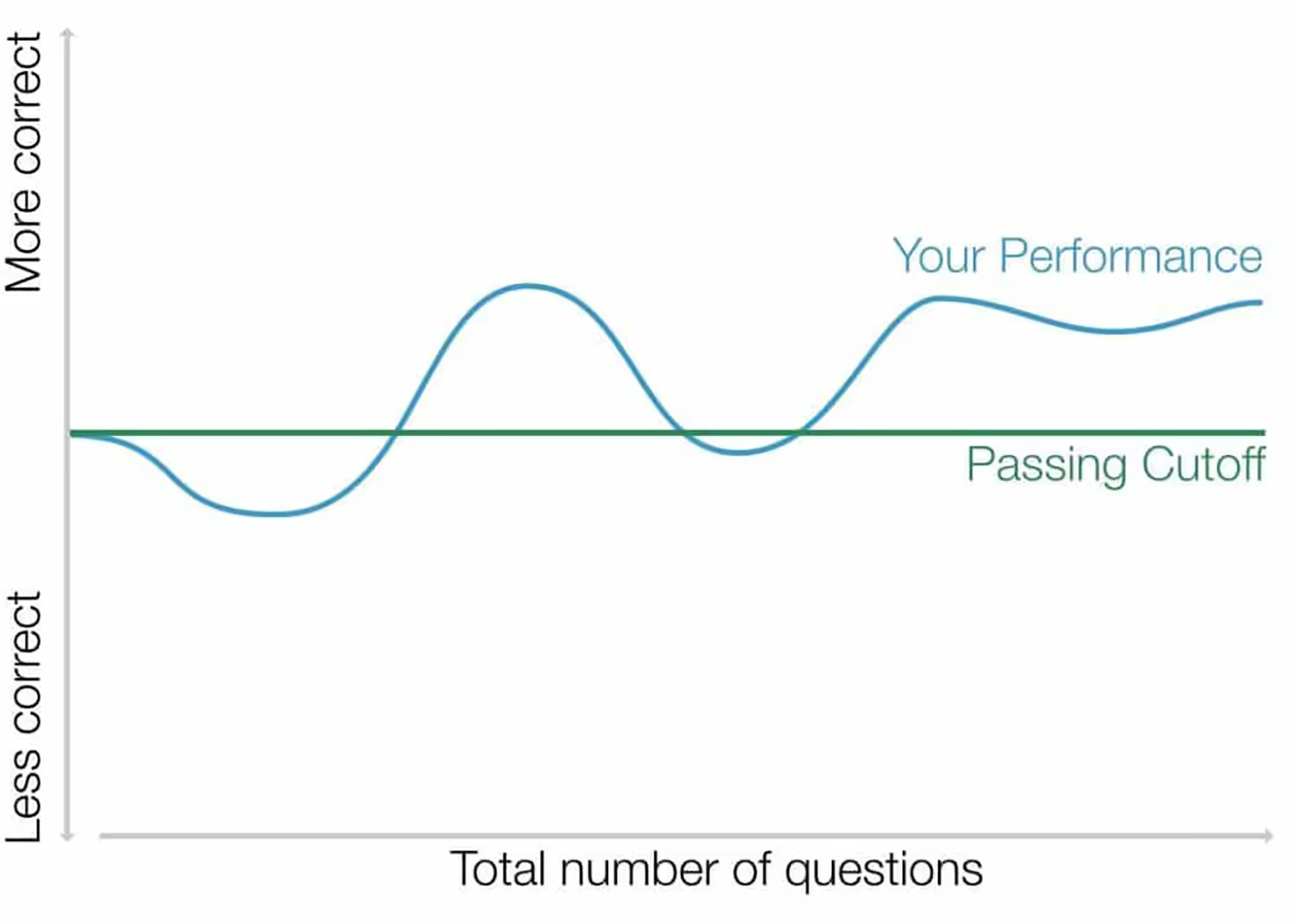
If you start getting overwhelmed by the wording of questions, that’s also a good time to try to take a deep breath and refocus. Stay confident.
Don't Cram
“Do about 50-100 practice questions per day, 5 or 6 days per week after graduation until the test. Take the day before the test off from studying; don’t do anything NCLEX-related.” - Austin Patrick, RN, BSN, Cleveland Clinic
Practicing many questions each day gets you in the routine of focusing for a long period like the exam will be. And the more practice questions you do, the more concepts you’ll be reviewing to prepare.
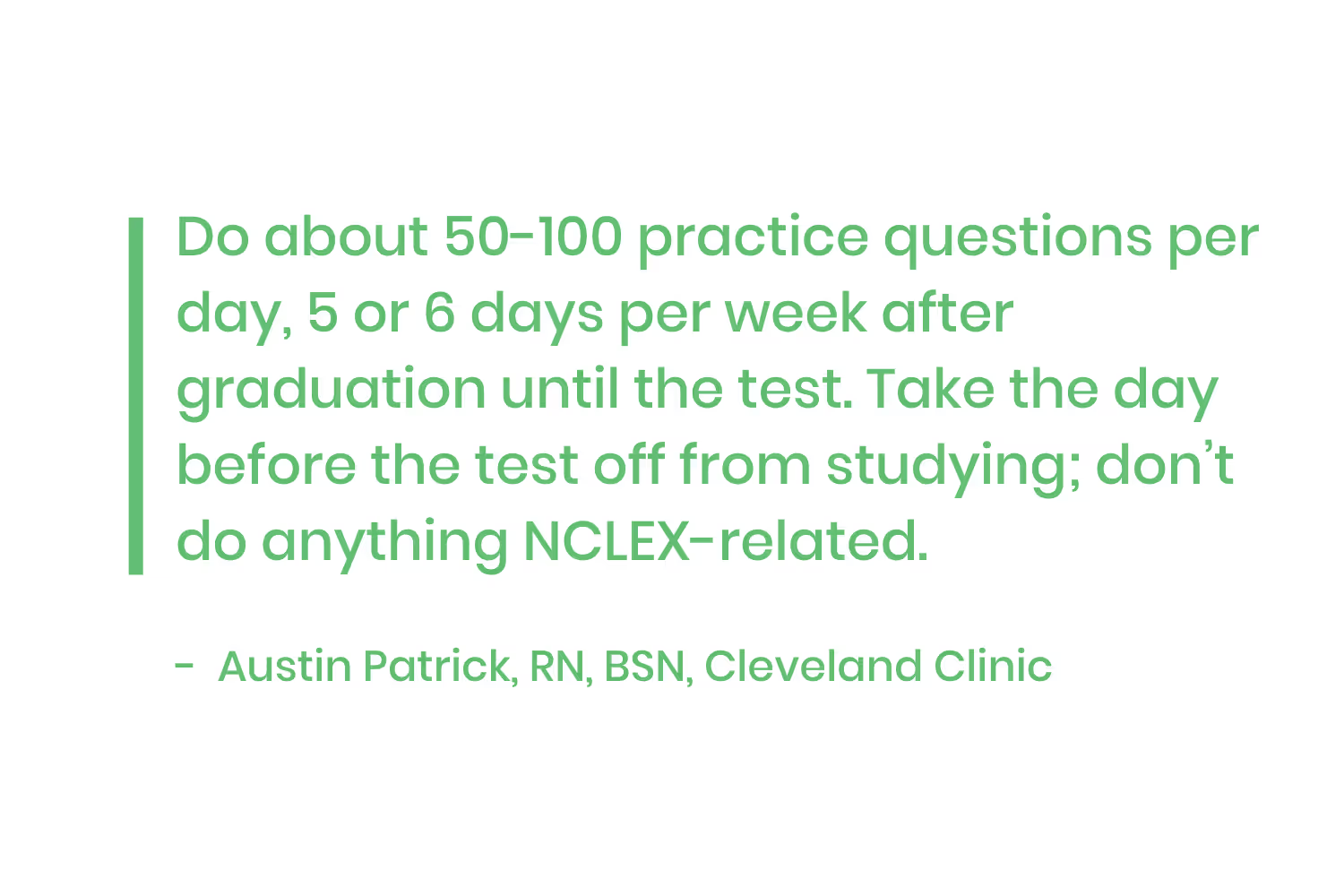
But give yourself a break on the last day before your test. Cramming is another form of passive learning which won’t be effective for helping you pass.
The final day won’t make or break your score, especially if you’ve been reviewing this much each week leading up to it. It will only create stress if you start getting questions wrong right before the test, and you could start to doubt yourself.
Take time the day before to relax so you go into the exam feeling focused.
Conclusion
The stress of nursing comes long before you land in the field. The structure of the NCLEX ensures that nurses who pass are ready for this stress because it uses critical thinking of situations.
Even though the exam is overwhelming to prepare for, there are a lot of steps you can take to help you pass. A majority of candidates pass on their first attempt. So you can breathe a sigh of relief.
Nevertheless, this test is different from the ones in nursing school so it’s important to focus on how to take the test, not just memorizing answers. The best way to do this is through repetition and practice to train yourself on how to take the test and how to select the right answer.
With so many preparation programs, there are ways to get used to the layout. This makes it easier for learning what the question is asking and how to select the best answer.
Emphasize your product's unique features or benefits to differentiate it from competitors
In nec dictum adipiscing pharetra enim etiam scelerisque dolor purus ipsum egestas cursus vulputate arcu egestas ut eu sed mollis consectetur mattis pharetra curabitur et maecenas in mattis fames consectetur ipsum quis risus mauris aliquam ornare nisl purus at ipsum nulla accumsan consectetur vestibulum suspendisse aliquam condimentum scelerisque lacinia pellentesque vestibulum condimentum turpis ligula pharetra dictum sapien facilisis sapien at sagittis et cursus congue.
- Pharetra curabitur et maecenas in mattis fames consectetur ipsum quis risus.
- Justo urna nisi auctor consequat consectetur dolor lectus blandit.
- Eget egestas volutpat lacinia vestibulum vitae mattis hendrerit.
- Ornare elit odio tellus orci bibendum dictum id sem congue enim amet diam.
Incorporate statistics or specific numbers to highlight the effectiveness or popularity of your offering
Convallis pellentesque ullamcorper sapien sed tristique fermentum proin amet quam tincidunt feugiat vitae neque quisque odio ut pellentesque ac mauris eget lectus. Pretium arcu turpis lacus sapien sit at eu sapien duis magna nunc nibh nam non ut nibh ultrices ultrices elementum egestas enim nisl sed cursus pellentesque sit dignissim enim euismod sit et convallis sed pelis viverra quam at nisl sit pharetra enim nisl nec vestibulum posuere in volutpat sed blandit neque risus.

Use time-sensitive language to encourage immediate action, such as "Limited Time Offer
Feugiat vitae neque quisque odio ut pellentesque ac mauris eget lectus. Pretium arcu turpis lacus sapien sit at eu sapien duis magna nunc nibh nam non ut nibh ultrices ultrices elementum egestas enim nisl sed cursus pellentesque sit dignissim enim euismod sit et convallis sed pelis viverra quam at nisl sit pharetra enim nisl nec vestibulum posuere in volutpat sed blandit neque risus.
- Pharetra curabitur et maecenas in mattis fames consectetur ipsum quis risus.
- Justo urna nisi auctor consequat consectetur dolor lectus blandit.
- Eget egestas volutpat lacinia vestibulum vitae mattis hendrerit.
- Ornare elit odio tellus orci bibendum dictum id sem congue enim amet diam.
Address customer pain points directly by showing how your product solves their problems
Feugiat vitae neque quisque odio ut pellentesque ac mauris eget lectus. Pretium arcu turpis lacus sapien sit at eu sapien duis magna nunc nibh nam non ut nibh ultrices ultrices elementum egestas enim nisl sed cursus pellentesque sit dignissim enim euismod sit et convallis sed pelis viverra quam at nisl sit pharetra enim nisl nec vestibulum posuere in volutpat sed blandit neque risus.
Vel etiam vel amet aenean eget in habitasse nunc duis tellus sem turpis risus aliquam ac volutpat tellus eu faucibus ullamcorper.
Tailor titles to your ideal customer segment using phrases like "Designed for Busy Professionals
Sed pretium id nibh id sit felis vitae volutpat volutpat adipiscing at sodales neque lectus mi phasellus commodo at elit suspendisse ornare faucibus lectus purus viverra in nec aliquet commodo et sed sed nisi tempor mi pellentesque arcu viverra pretium duis enim vulputate dignissim etiam ultrices vitae neque urna proin nibh diam turpis augue lacus.


.avif)

